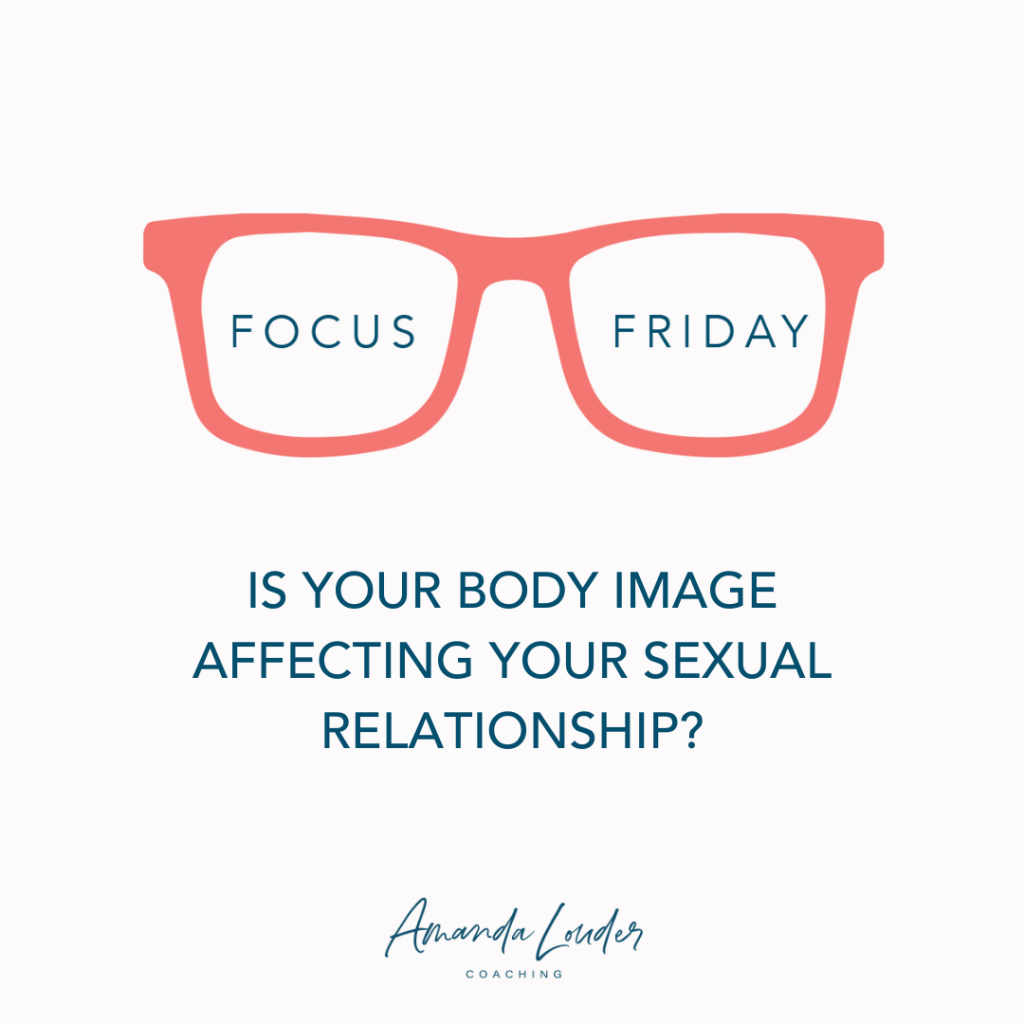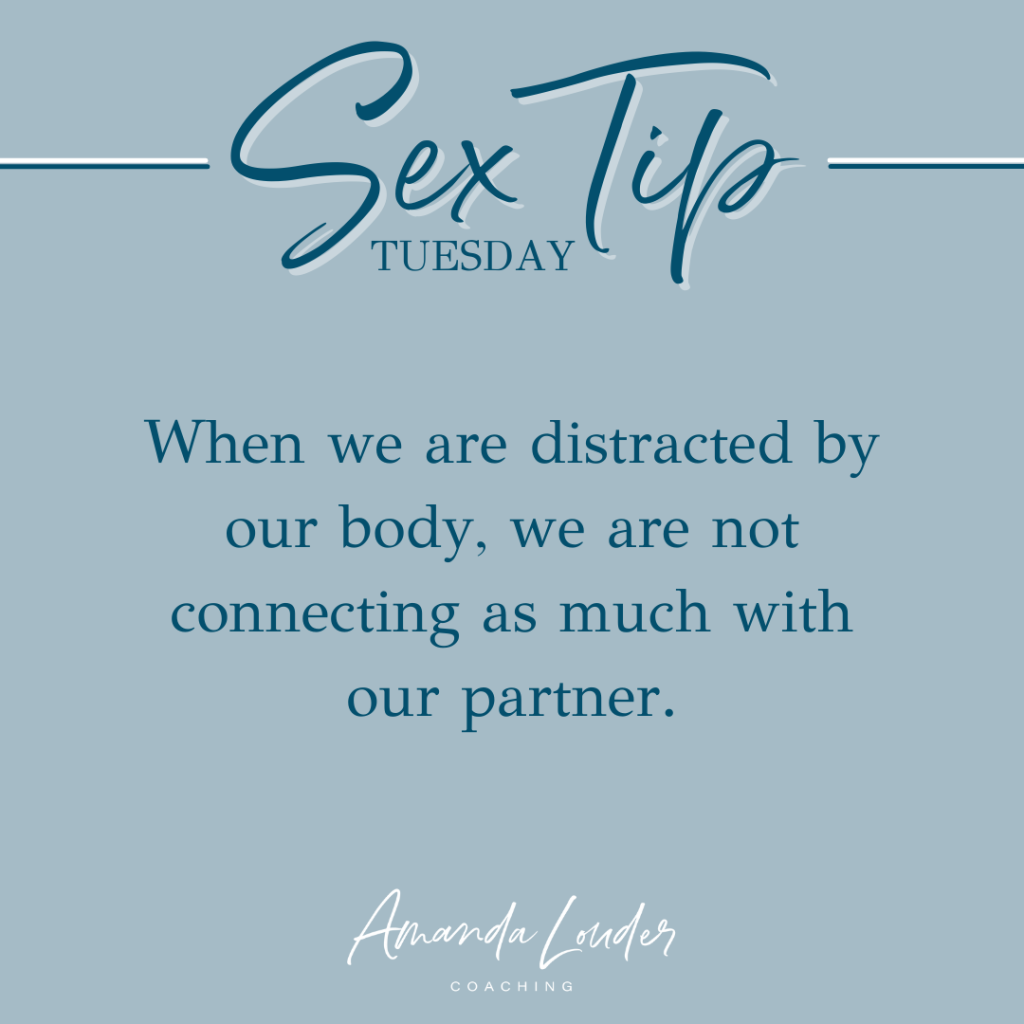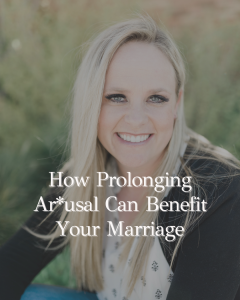
How does your body image affect your partner? That’s what my guest Amber Price and I are talking about in this episode. Even though body image issues is something you see a lot in women, men have body image issues too. Listen in as we discuss what we do, why we do it and what we can do about it.
You can find more information about Amber at:
Show Notes:
Follow Amanda on Facebook and Instagram.
Join Amanda’s Private Facebook Group.
References for this episode:
You can find more information about Amber at:
Show Summary:
Amanda: Hello my friends. Welcome back to the podcast. So happy to have you here and I’m really excited to share with you this interview today. But before we get started, I just wanted to do a quick reminder that we have coaching available for both men and women now women. You can still join my Embrace You Elite Society membership for just $49 a month.
And men, I’ve got the applications going for my small groups. So if you are interested in either one of those options, please go to AmandaLouder.com and click on Get Help in the menu, and click on men or women, depending on what you are, and you can see what is available.
All right, let’s get to today’s interview.
Amanda: Welcome to the podcast. Amber, can you introduce yourself to my audience please?
Amber A. Price: Yes, I would be happy to. So, I’m Amber and I am, first and foremost, I like to say I’m a mom. I have got four boys. They are ages 19 to 11. So basically I have a whole bunch of teenage boys, which is a ride. And then I’m married to a chemistry professor husband.
Amanda: Awesome.
Amber: And we, so I am currently getting my PhD in Marriage, Family and Human Development. So studying things relating to connections and specifically things that we do that sometimes thwart our connection. And then how we can overcome that. Things that we think are doing, that we’re doing, that are promoting connection that sometimes aren’t.
Amanda: Oh, interesting.
Amber: Yeah. Yeah. I really love studying what I study. On a more personal level, I really, really love chocolate in all forms, especially cookies. I love, love, love cookies, and I love hot chocolate. I drink it just about every day, all year round.
Amanda: Oh, I had some this morning.
Amber: I mean, did you? Oh, nice.
Amanda: It’s snowing outside.
Amber: So I like to drink it even in July on my back deck, which people think is weird but, I just love it.
Amanda: So yum. Yeah. Cool.
Okay. So you have done some amazing research that I would absolutely love to talk about. I was reading an article that you contributed to and it said that 97% of women feel dissatisfied with some aspect of their body. That is a staggering number, right?
Amber: Right. Yeah, yeah.
Amanda: Oh, like it just makes me so sad that so many women are so, you know, have such dissatisfaction with these beautiful bodies that have been created for us.
Amber: Right. That, and when you think about how much we place our value and our worth on our body as women. That tells us a lot about what’s going on with women’s mentality things.
Amanda: So in my work, I’ve seen a lot of this obviously, and women who, when it comes to sex, either they don’t wanna have sex. They don’t wanna have sex with the lights on cuz they don’t want their spouses to see them. And they spend a lot of time, what we call spectatoring where they’re kind of, you know, viewing themselves and paying more attention to what’s happening with their body and how they’re positioned and what is what they look like instead of being present during sex, which takes away from the sexual experience and what they could be doing. Right. But in your research, you weren’t just looking at what was happening for them, right? You were also looking at how what they believed about themselves and their body affected their partner. So can you tell me more about that?
Amber: Yeah, and I think maybe it’s good to preface this by saying, you said 97% and the research is a little fuzzy, but about 90% of women feel dissatisfied with some part of their body, but it’s pretty high for men too. I think it’s hanging out in the 60 and 70% range for men.
Amanda: Wow, okay.
Amber: It’s pretty big. And it’s only climbing for men, right? There’s just increasing pressure for men on what they should look like. It’s not as high as it is for women, but it is. It is happening.
Amanda: That’s still a really high number for more than I would’ve thought for men.
Amber: Yeah. And I mean, there’s a few things that are a little different for men and women.
Like the ideal male body that media is telling us is actually more achievable than the female body. Not that we should be buying into it either way. Right. I mean the pressure’s on for both is the important point. And so, there’s lots and lots and lots of research that shows that your body image is closely related to your sexual relationship. And like you said, like it makes sense because if you are thinking too much about what you look like, you’re disconnecting from the actual experience and you’re kind of watching yourself instead of experiencing it, like you said, the spectatoring.
So there’s lots of research that backs that, but what we wanted to do is look at how your own body image might impact your partner and vice versa. So what’s really interesting about this one is that the findings we found was that, if you like your body, if you’re comfortable with your body, that promoted a healthy sexual relationship for not only yourself, but your partner also, and that this went both ways. It was for men and for women. So men’s body image impacted women’s sexual experience and women’s body image impacted men’s sexual experience.
Amanda: When you say impacted, impacted in what way?
Amber: What we measured in this study was more of a measure of, it was called sexual harmony. So it’s more about sexual connection. So do I enjoy the sexual experience and things like that. It was less about function, you know, orgasm consistency or frequency or things like that. Those things have also been examined and yeah, there’s lots of correlations there with, if you have poor body image, you’re less likely to do all of those things. But we were looking at kind of a broader, how happy do I feel with the connection I have in my sexual relationship with my spouse, that kind of thing more.
Amanda: Okay. And so, and we know like, I mean, yes, function is fun and important, but the reason that we’re having sex in the first place, hopefully is more about the connection, right, that we feel.
Amber: Exactly.
Amanda: So if that’s being impacted, then that’s huge. Right? So what are some of the things that came about from this disharmony?
Amber: We found that there was more harmony if they were positive, like if they felt good about their body. And then of course, on the flip side, if you didn’t feel great about your body, it was more likely that you were what we called sexually inhibited.
Amanda: Okay.
Amber: So if you think about the word inhibited, obviously that’s gonna mean you are less willing to let maybe your spouse look at you. And maybe it applies beyond just looking at you visually. If you’re feeling sexually inhibited, maybe you’re less likely to have a conversation about what you want in sex, right? Like if you’re holding back sexually, then you’re probably not going to have that conversation. You may not be willing to get vulnerable in the sexual experience or maybe even at a broader level. We didn’t exactly test that. But you know, how willing am I, you know, you undress for your spouse, maybe both physically and emotionally in a sexual experience. And so if you’re inhibited or if you’re not comfortable with your body, which is so closely tied to yourself, you may be less willing to really show up and let your partner know you at a deep level.
Amanda: Yeah. I can see this impacting, you know, inhibiting in the physical realm, in the emotional realm. In the psychological realm. In the spiritual realm. Like it can really inhibit you in all aspects in different ways.
Amber: Yeah. Yeah. Building on that, one thing that I found really interesting from this study is that if the man had good body esteem, his wife had less sexual inhibition, so maybe we don’t always think about that, but maybe if the man feels good about himself, he’s freeing up the woman to also just feel like she can show up as herself in the relationship a little bit more.
Amanda: Mm-hmm.
Amber: Maybe because there’s so much pressure on women and how they look. Whereas if he’s judging himself on how he looks, what is she thinking? Oh, he must not like how I look either. You know, like it’s maybe crossing over into that for her. And so she’s less engaged in the relationship then.
Amanda: That’s really interesting to me because, so in my first marriage, and I think, I don’t know how much I’ve shared actually on this podcast about it, but my entire marriage revolved around my size. How much I ate, how much I exercised. My former spouse was monitoring my weight all the time and how much I ate and all that. And I know based, you know, based on everything that I’ve done now and figured that out kind of towards the end of our marriage, that it was all based on his trauma. And the control is how it was exhibiting.
But I also know that he’s also had his own body image issues. And so that’s so interesting to me because like I actually felt okay about my body. I mean, not like you. I was still, I remember there’s this picture of me on the beach when I was like 16 and I remember feeling fat on the beach, and I would look at the picture. I’m like, holy cow. What would it be like to be that thin again? Right.
Amber: Yeah. Yeah.
Amanda: So I mean there, of course there was, I had my own issues, but not to the extent. But once I got married and like he had hid his issues, it just made mine exponential.
Amber: Yeah. Yeah. And that’s exactly what we found. Right. If the man’s super fixated on it, well, and there’s also research, this isn’t part of our study, but there’s also research that says if the partner is objectifying himself and or obviously if he’s objectifying his partner, you’re not gonna have good outcomes, right? You’re gonna hold back sexually, you’re gonna hold back more than just sexually. You’re gonna hold back emotionally too, like we’ve already said.
Amanda: Oh, absolutely. So maybe talk about objectification a little bit just to make sure that everybody is on the same page about what that means.
Amber: Right. So objectification is literally just treating someone like an object. I mean, I think we often think of objectification as like the male gaze, the just that feeling that women have, that they’re being looked at for their body versus looked at for themselves. For who they are.
Amanda: Yeah.
Amber: Objectification is a big problem. What becomes an even bigger problem is the self-objectification that we do. Women especially, but also it can happen for men. We internalize this idea that we are valuable for what we look like, and so then we start to self objectify, which means that we are trying to watch ourselves, like you said. Watch ourselves to see what we look like and that’s, this isn’t just sexually, right? This is in everything that we do. We watch ourselves to see what we look like, and that just disconnects us from our body. All of a sudden, our mind and our body are not connected to each other.
I like to, this is a fun example I like to use for it. I like to go to Zumba. I like to dance at Zumba classes, right? I’m just there having a good time. I go to the rec center. It’s pretty like you’ve got every age, every, just lots of different variety of people. Nobody’s there because they’re a professional dancer or anything. They’re just there to have fun. Right?
Amanda: Right.
Amber: So I’m there and I dance and I have a great time. But occasionally I’ll start to think about what I look like while I’m dancing or I’ll start to watch myself in the mirror more. And I almost always mess up at that point because all of a sudden I’ve created that disconnect of mind and body again. Right? Like I’m trying to see myself and now I’m not experiencing what I’m doing anymore.
Amanda: That is so true. When I moved to my house here about three and a half years ago, there was a lady in my ward, she’s probably maybe in her late fifties or maybe 60 ish, and she was like, you have to come to Zumba. We’d love to have you. And so I was like, okay. I love Zumba. Sure. I was the youngest person in the class by probably 15 to 20 years, like most of the women in that class were like 80 and older.
Amber: That’s awesome.
Amanda: And they were just dancing and having fun, they didn’t care. And it was so freeing to just not have to worry about how I looked compared to everybody else. But just enjoy myself and enjoy my body and have fun in the experience. I love that so much.
Amber: Yeah. And yeah, so you can see, I mean, that’s just one example of how self-objectification might disconnect you, but it can happen. In so, so many ways in every area of our lives, and sometimes, so I said like sometimes we think of objectification as the problem.
The male gaze or you know, objectifying each other. But it’s actually women objectifying other women more often than men objectify women at this point. And then I think that just like that just creates a cycle of self-objectification because you feel like you’re being judged or valued for your body everywhere you go. And sometimes it’s even like somebody trying to be positive, you know, they’re complimenting various aspects of you, but it still puts the focus on your body.
Amanda: Yes. And so I, I love this, we don’t comment on other people’s bodies ever. Period. Like that’s just a rule we have in our house.
Amber: Yep.
Amanda: We don’t do that because that just doesn’t help anybody. Doesn’t help you, doesn’t help anybody else. So tell me what else the study found?
Amber: So there was one other finding that was kind of interesting. Um, and this was only for women, but women, and this one’s gonna seem a little counterintuitive, but women who were higher on body esteem or like felt better about their body were also more likely to have sexual obsession. So that was the third sexual outcome that we looked at. And sexual obsession just means, it means what it sounds like. You’re obsessed with sex. It dominates your thoughts. It maybe controls some of your life and things. So generally speaking, we wouldn’t think of that as a good thing. There is some research that shows that that can be a good thing for women. So this one’s a little bit mixed and we don’t totally know what to make of that. It could be a positive thing because she’s comfortable with her body, maybe she’s more willing to engage in the sexual relationship, and so it becomes something that she thinks a lot about. On the other hand, it could go the other way, and again, it maybe it’s not helpful to throw it out there that we don’t know, but it’s something to think about. It could go the other way, and it may be that she’s so interested in what she looks like. She’s saying she feels good about herself, but it’s because a lot of body work is going on. Right? Like she’s, she’s doing all the things that she needs to do to make herself think she looks good, but that’s tied probably pretty closely to a lot of validation seeking in her life. She’s probably looking for other people to tell her that she’s valuable and worthy, and she’s probably doing that through her body. And sex can also be that a lot of times.
Amanda: Yeah. Oh, you know. Oh, a hundred percent. Yeah. Yeah.
Amber: Like kind of the anxious attachment kind of thing, like, make me feel good about myself because you want to have sex with me, or, you know, I can feel good about myself because we just had sex or things like that. So it may go into that.
Amanda: Yeah. Which, you know, when I talk about it with my clients, we tend to go into either a kind of a weak position or like what appears to be a strength position, but it’s not actually strength. It’s actually more weakness. So you get this both with men and women. You get these women who kind of tend to be indulgent or even coming from a more entitled position, which is also a weak position when it comes to sex. A strength, a position coming from strength is I love who I am. I’m comfortable with who I am. I would love to do this with you, and I would also be okay if you don’t want to.
Amber: Yeah. Yeah. That is a good place to get, but it’s good. Right, right.
Amanda: Which is exactly what we’re working on both in my women’s program and in my men’s program is coming from this position of strength and integrity that’s value-based and not seek that validation through sex or other things, but really like just knowing it inherently and being okay with however your partner responds, but I think a lot of people see that as like, oh yes, they’re so, you know, inhibited or uninhibited and they’re so, you know, they’re so sexually confident, but yet it’s actually a weak position because it’s usually validation seeking.
Amber: Yeah. Yeah. And that, what you were saying reminded me of a theory of connection that I just absolutely love, and I usually end up tying it to just about everything because I love it so much. But it’s Martin Buber’s Theory of Connection, I don’t know if you’re familiar with this, but he talked about two different ways that we can relate to other people. So he called it the I it or the I thou. Okay. It’s a, I feel like that’s a little bit of a weird translation, but it’s, cuz it’s from German and also the early 1900s.
But, so an I it relationship is kind of what it sounds like. It’s that objectification. Right? But it’s outside of just appearance. It’s when you’re using somebody else as a means to an end for yourself. As somebody to facilitate your own goals and your own needs or things like that. So like I think about it, if my husband walks through the door after work and I say, oh, did you remember to get the groceries? Or Can you quick unload the dishwasher? Or things like that. Like, I’m not seeing him, I’m not thinking about him. I think about what I need, so I’m treating him like an I it.
And the opposite is the I thou, which is more like treating somebody like a you and seeing them as a legitimate other, is what he called it. And recognizing that they have needs and desires too. So, you know, instead my husband walks through the door and I think he may have had a hard day too. I might still need to know if he picked up those groceries, and I still might need his help unloading the dishwasher. But can I see him as a human first and say, how was your day? Or, go over and give him a big hug because I know he loves that. Or, you know, just it, it just shifts that from being, you are doing this for me versus a connection aspect of things. And so I think what you were saying with the, um, you could be in a sexual relationship and you can even be doing things that you think are positive for it. You may be always doing, willing to do things for your husband in the relationship, always willing to please him and things like that, but that can still come from that I it position if you’re doing it to make yourself feel like you were a good wife and you did your duty or things like that.
Amanda: Yeah. And from the male perspective we often get this, the nice guy who just thinks they’re doing everything they need to as a way to earn sex, to earn validation, to earn all of these things. But it’s not coming again from that strength, it’s coming from a place of weakness that it has to be earned rather than like, this is who I am, this is who I want to be, this is how I wanna show up in my relationship in my marriage. Rather than you know, I need the validation through this.
Amber: Yeah. Yeah. And then it just limits your ability to actually connect, which I think then again, ties back to that body image thing. You know, if you’re, if you’re holding back on your body image, you’re, you’re making yourself an I it or you’re making your partner an I it, and then that limits your ability to connect in that really deep I thou kind of way.
Amanda: Yes. And I mean, I think wven though we don’t do it well, that’s actually what most of us want. It’s that intimacy and that connection that we’re all truly seeking, whether that’s through physical or emotional or whatever. I mean, cuz we kind of tend to come at it from different perspectives, right? But it really, that’s the intimacy and the connection that we’re all truly seeking, that we’re actually keeping ourselves from by being in these positions. So maybe let’s talk about next what we can do to help or fix this problem.
Amber: Yeah. And it, and it feels daunting, right? Because body image is such a big part of us, and I have to be upfront that it’s a struggle for me too. Like I can talk about this all day and say, We shouldn’t put our worth in our body, but we’re programmed to do it. And it’s everywhere around us. Like everywhere around us is pressuring what we look like. But I think the first thing that you can do is to really think about that disconnect, you know, disconnect your worth from your appearance as much as you can.
When you find yourself cycling into that, just stop yourself in that moment when you look at yourself in the mirror or in a picture or something like that, and you think, ugh, about whatever aspect of your body. Put yourself back and say, that has nothing to do with what I’m worth.
I am, you know, I’m a good person. And, and then second maybe is, value your body for what it does for you, right?
I mean, that’s similar with the Zumba thing. Like I love that I can go and dance Zumba. It’s so much fun to me. I’m so grateful that I can do that regardless of what my body looks like while I’m doing it.
Amanda: Right.
Amber: Putting this into a sexual context that can be a little bit more challenging. One of the things that my PhD advisor studies is sexual mindfulness, and I think that this ties in really, really well with that. So if you can kind of slow down your thoughts and really try to focus them instead of on wherever they’re going with what you look like, or, I mean, this would apply even just not with things about what you look like, but what you need to get from the grocery store or any of those things.
But if you can catch yourself in those moments that you’re getting distracted and thinking, oh, look at my belly, it’s jiggling, or any of the things that you might be thinking. Instead move it from that and try to think about, oh, what do I feel like right now? What does the touch that I’m feeling right now feel like just really, really pay attention to those sensations and that can help pull your mind back to the sexual experience and you might have to do it over and over and over and over again. But that’s okay. You can do that.
Amanda: Yes. I always talk to clients about, um, like paying attention to the five senses as a way to get back into your body rather than observing or spectatoring what’s happening around you. You know? What am I smelling? What am I seeing? What am I tasting? What am I touching? What am I hearing? And really getting into those five senses pulls you back into your body so that you’re not so focused on what your body actually looks like. And I think so many times, I mean, women come to me all the time and say, well, I noticed my mind constantly wandering during sex and she’s like, I wanna stop that.
You might not be able to. But what you can do is notice it and just gently bring it back without judging.
Amber: Yeah. Yeah.
Amanda: Like we’re just constantly bringing it back, like you said, over and over and over. So if you notice that it’s constantly going to your body or whatever else, Just say, oh, yep. There it is again. And I’m gonna bring it back. There it is again. And I’m gonna bring it back.
Amber: Yeah. And an important point with that, I think that’s maybe not directly tied to the body image, but why are you so worried that your mind is on other things? Is it because you have an expectation of what this experience should look like? And that’s not gonna help you either, right. So, no, just again, disconnecting, like, reconnecting with your body and just being in the moment as much as you can. But doing it in a way that works for you. Not what the media showed you it’s supposed to look like or anyone else said it’s supposed to look like.
Amanda: Right. And I think part of it is when we are distracted by our body or anything else, we’re not connecting as much with our partner. Right. And that’s the whole purpose is to connect with them. And so if we’re noticing that we’re not, then we have to bring it back so that we can connect with them. Cuz that’s actually what we’re there for.
Amber: Yeah. And do it without beating yourself up. Because we all do it.
Amanda: We all do it. Yeah, absolutely. Well, thank you so much Amber, for being here with me today. Where can my audience find more about you and your research and what you’ve got going on?
Amber: Yeah, so I have a website, it’s just amberaprice.com. So just my name. And I’ve got resources and guides and courses there that are about some of the things we talked about specifically with the connection piece of things. I’m working on a course on body image, which will be coming out shortly.
Amanda: Oh, awesome. Great.
Amber: Yeah, so, and then just on Instagram @amber.a.price is where I hang out.
Amanda: Yeah. Awesome. Well, thank you so much for being here with me today.
Amber: Yeah, thank you.
Amanda: All right, my friends, hopefully you found that interview with Amber Price so interesting. If you want some help working on your body image so that it doesn’t affect your sexual relationship and your partner, please come into coaching with me. We talk a lot about body image in coaching because it is so prevalent in our society. So I would love to help you with this. You can go to amandalouder.com and click on Get Help in the menu to see more information, and we’ll see you next time. Bye-bye.





